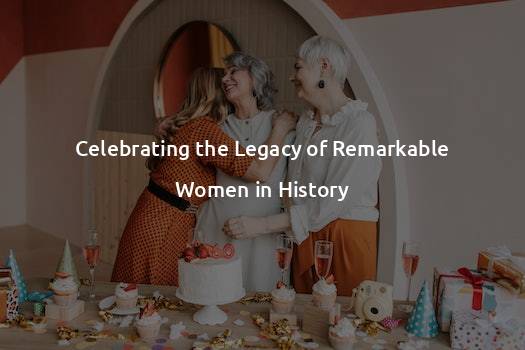Celebrating the Legacy of Remarkable Women in History
The history of the world has been shaped by the contributions of notable women since time immemorial. From the ancient stories of brave Queens like Cleopatra of Egypt and Boudicca of the Iceni tribe, to the pioneering efforts of modern-day women like Michelle Obama and Malala Yousafzai, women have been breaking barriers and making positive impacts throughout the ages. Therefore, it is essential to celebrate the remarkable legacy of women in history who have paved the way for generations of women to come.
The first woman to receive a Nobel Prize was Marie Curie, a nurse turned physicist who discovered radioactivity. She was the first female professor at the University of Paris and paved the way for later generations of women to pursue scientific careers. Similarly, Ada Lovelace, who lived in the 19th century, was the world’s first computer programmer and made significant contributions to the development of early computing machines. The first anniversary of Lovelace Day, which celebrates the achievements of women in science, was observed in 2009 in honor of Ada Lovelace’s contributions to science.
Moving on, the suffragettes were an integral part of the fight for women’s rights in the 19th and 20th centuries. These women broke down social norms and stereotypes to demand the right to vote, thereby paving the way for women’s voices to be heard in government: Susan B. Anthony and Elizabeth Cady Stanton are widely recognized as leaders of the women’s suffrage movement in the United States. Women’s suffrage advocates also participated in public protests and hunger strikes to demand voting rights.
World War II led to a breakthrough for women as a large percentage of males were engaged in war and women had to step in and fill the gaps left in the workforce. The contributions of women made them equal partners in war with men. In the United States, the story of “Rosie the Riveter,” a symbol of American female empowerment and industrial might, became a metaphor for women’s contributions to the war effort. It was during this period that the history of women’s participation in rights movements, such as civil rights, began to take root.
Following the war, a new wave of feminism arose, driven by the desire for greater equality in terms of pay, reproductive rights, and equality in the workplace. Women like Gloria Steinem and Betty Friedan, leaders of the feminist movement of the 1960s and 1970s, set the stage for the “second wave” of feminism in the United States.
Modern women trailblazers continue to pave the way for others to follow in their footsteps. The first woman to become a major party nominee for president in the United States, Hillary Clinton, significantly advanced the cause of women’s political representation. However, it is unfortunate that some sectors still struggle to recognize the value of female representation.
In India, Rani Lakshmibai of Jhansi is one of the most revered women in history, often described as a courageous and fearless warrior. She led her armies into battle and rose in the ranks as a fierce leader who refused to back down in the face of adversity. The legacy of women like Rani Lakshmibai has paved the way for modern-day women to follow their dreams and fight societal stereotypes.
Today, women continue to break barriers and make history in many fields worldwide. Kamala Harris became the first woman, first person of South Asian descent, and first African American woman to hold the position of Vice President of the United States. Simone Biles, a gymnast in the United States, made history after achieving the most World Championship medals in history. Meanwhile, Wangari Maathai of Kenya, the first African woman to win the Nobel Peace Prize, made significant contributions to the environment that continue to be felt today.
In conclusion, the history of remarkable women in our past is an inspiration and a vital reminder of the importance of fighting for equal representation and opportunities. The contributions of women, both famous and unknown, are what have made it possible for later generations of women to achieve their goals and break the gender stereotypes that limit their potential. Remembering and celebrating the achievement of these remarkable women is key to ensuring that their legacy will inspire future generations to overcome obstacles and achieve great things, just as they did.
TLDR;
The legacy of remarkable women in history, from Cleopatra of Egypt and Boudicca of the Iceni tribe to Michelle Obama and Malala Yousafzai, reminds us of the importance of fighting for equal representation and opportunities. Women have made significant contributions in various fields over the years, including science, politics, and athletics, among others. By celebrating these contributions of these women, we can inspire future generations of women to break down barriers and fight for gender equality.







